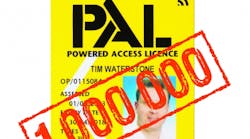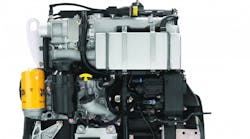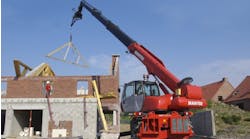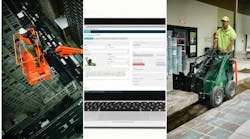As part of our examination of the distribution industry,RER is launching a series of interviews that will take a look at this topic from a variety of perspectives. MMD Equipment, Swedesboro, N.J., is a major supplier and a distributor. Its president and CEO, Ron Johnson, looks at distribution, rentals, manufacturers and the economy.
RER: How do you approach your dealer network in this day and age and what do you expect of your dealers and marketplace?
Ron Johnson: Of course, the definition of a dealer has changed. In past years, we used to look in the AED dealer directory and call on all of the dealers in any given city. Generally speaking, there was a dealer available who fit the profile of what any supplier was looking for. Today, it is harder to find dealers, particularly on the light equipment side. Many of them were bought by the national chains, and were altered to look like more traditional rental operations. So, we have to look for more non-traditional ways of distributing our products. We expect dealers to aggressively sell, rent-to-sell and rent our products. We expect them to provide adequate support. However, we find ourselves doing more and more of the service after the sale. There has been a significant change in the retail channel.
How has your company changed in terms of the way it approaches the end user and the rental market?
We still respect the role of the dealership and the rental company. It is our goal to let them do their jobs. However, with so many suppliers employing “pull-through” efforts, it is imperative that we do everything possible to make end users aware of our products. We constantly look for ways to do this in a cost-effective way. Advertising is one way. Telemarketing is another. But, the answers are still evolving. However, professional sales people are still the best way to get the message out.
What kind of changes do you expect to see in the coming years?
I still feel that there will be more of a movement on the part of some suppliers toward direct sales. I also feel that suppliers will have to figure out a better way to provide support, on a more direct basis. It is my feeling that there will eventually be independent general service facilities that will handle service, and perhaps even warranty, for a number of suppliers. Many dealers and rental companies seem to be less interested in service. MMD has no intention of competing with its customer base. But, I would not be surprised to see some suppliers gravitate toward the retail side as dealers become more difficult to find.
What changes and trends do you foresee over the next few years that will affect the rental market?
There will always be movement in the rental industry. There may be more consolidation, but not like it was a few years ago. I think all rental companies, including independents, will become more sophisticated in terms of the type of products they will buy. They will look harder at return on investment, and they may tend to seek out products that offer a longer economic life. There may be more of a trend toward niche rentals. Rental companies may find strength in specialization. A lot may depend on changes in tax laws.
Information is the key. Most rental companies will have better information, and they will use it. Depending on the success of companies like Lowe's and The Home Depot, there may be a need for expanded hours in the evenings, and on weekends. We may see more rental companies open on Sundays. There is still so much room for rentals to become a greater part of mainstream America. There are some great rental people out there. Innovation will continue to be a strong component in rental center growth.
Is there any advice you'd give to a rental company owner about how he approaches his business over the next few years?
I would always advise rental companies to take a harder look at their purchase criteria. Look beyond the promises of a sales person. Be more proactive in the purchasing process. Look at the comparisons from product to product. Hold suppliers accountable. Visit suppliers, and see their capabilities, first hand. Seek out objective references. A comprehensive buying decision is always well worth the time. A good salesman cannot make a bad product perform well.
Are there any particular areas that, in your opinion, rental companies need to make particular efforts in? What kind of improvements do you feel are most needed?
It has always been my opinion that more rental companies need to develop and maintain professional sales and marketing efforts. The small rental company generally has some advantages over the bigger ones in terms of personalized service, and attention to detail. They can also make changes in policy more quickly. Yet, in many cases, they don't seem to be able to get this word out to the available customer base. Some customers prefer to deal with a smaller company. To me, a commissioned salesman is a fairly inexpensive way for a smaller rental company to compete with a larger one.
Margins have diminished to manufacturers in recent years. How is this affecting product design, marketing, research and development?
Margins are definitely an issue. It is a by-product of the market maturation process. Profits are necessary for product development and support. Those suppliers that do not understand their cost will eventually dry up, and be blown away. It is easy to say it is the problem of the suppliers. But, when I see the obvious and continued cheapening of products, it becomes a customer problem as well. We have to do a better job of educating customers as to the value of products. When we cannot justify a higher initial price for a superior product, we simply have not done our jobs. But, the answer absolutely cannot be the compromise of quality.
What kinds of trends and improvements are we likely to see in your type of equipment over the next few years — not only with Mitsui products, but in the industry as a whole?
Products will become more user-friendly, because making them simpler costs less. Products will become more refined. Manufacturers will respect the operators when designing products, because it will become more apparent that operators are providing more input into the buying decision. Rammers will transfer less shock back to the operator. There will be more air-conditioned cabs on dirt equipment. Operator compartments will become more comfortable. There may be more electronic safeguards that will protect the operator from injury. It is all a matter of refinement, with cost-down in mind. While most product designs are fairly mature and evolved, there are still opportunities to make them better, and safer.
We're all amateur economists to a degree. How do you see the economy developing over the next couple of years?
I have been wrong so many times, I am hesitant to comment. But, Mr. Greenspan and some of the best economists on earth have not fared much better. So, here's what I see … A continuing economy that looks a lot more like 2003 than 2000. Many people have now lost jobs, because of a correction in capacity, driven by a lack of demand. Therefore, people will tend to keep houses and cars longer, more like Europe. We are already seeing fewer equipment turns in the rental industry.
Let's face it. With today's cheap interest rates and a fairly good availability of money, it is a little frightening to think that the economy is still stutter-stepping. What can we expect when interest rates move to 8 percent or 9 percent and money is a little harder to come by? I still believe that economic prosperity is more important to the U.S. than almost any other country. So, we will always find a way to have a higher standard of living. But, we are in for some fundamental changes in the way our economy works, and responds to world affairs. We are truly in a world economy. What makes it difficult is that some of the younger people in our industry have never gone through this kind of extended downturn. They don't always understand that the economy is cyclical. There is reason for some optimism. But, I am afraid many people may be using the false Internet economy during the Clinton administration as a benchmark.
What changes in manufacturer-dealer/distributor relationships do you expect to see in the next few years?
I am hopeful that suppliers and dealers will develop a sense of partnership. There has to be a better understanding, and perhaps more trust. We have to be better listeners.





